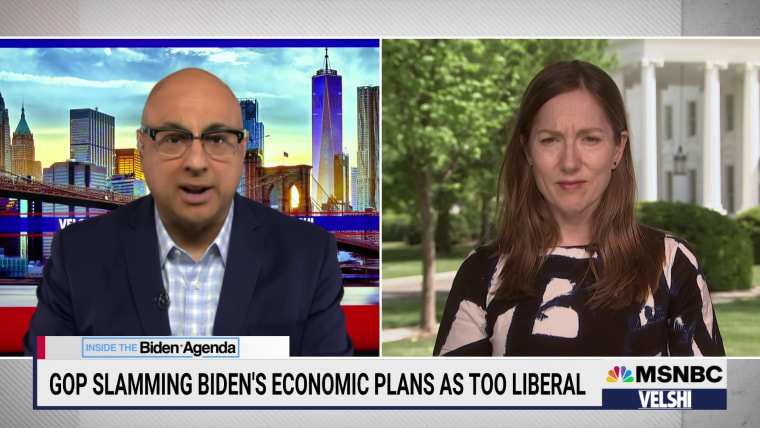Working for companies owned by well-heeled private-equity firms can mean lower wages for employees
Alma Jordan, a certified nursing assistant at the Marcella Center nursing home in Burlington, N.J., respected the residents she cared for there over the past 16 years. They were like family, she said, and she believes they’ve appreciated her attentiveness, especially during Covid.
Not so, the nursing home’s new owner, Jordan said. After Complete Care Management, the largest for-profit nursing home operator in New Jersey, took over the 150-bed Marcella Center in April, it slashed worker benefits, she and other employees as well as a representative from their union told NBC News.
Amid the pandemic, Jordan’s paid holidays were reduced and her monthly health insurance costs more than tripled, she said. The company stopped contributing to the employee pension, replacing it with a 401k plan that had no employer match or contribution. Complete Care took away vision insurance and stopped a reimbursement program covering employee education costs, so Jordan, 45, won’t be able to recoup money she spent working toward a degree to become a licensed practical nurse.
“I put all my effort into this company and someone else took over and they don’t want to give us what we deserve,” Jordan told NBC News. “For them it’s business, it’s not about the staff and the residents. It’s only about making profits.”
In late September, Jordan quit her position at the facility. The reduced benefits and deteriorating work conditions got to be too much, she said.
When Complete Care came in, Jordan and other Marcella workers were operating under a union contract struck with the facility’s previous owner. Complete Care did away with that contract, which also covered four other unionized New Jersey nursing facilities it recently acquired, according to the Service Employees International Union.
Complete Care owns 61 facilities in eight states, including Connecticut, Maryland and Wisconsin. It is backed by a private-equity firm called Peace Capital in Lakewood, N.J. whose principal owner is Sam Stein.
Jordan and her fellow workers are not alone in experiencing reduced circumstances after their company is taken over by a private-equity firm. The new titans of finance, these firms use large pools of debt — typically raised in what’s called the leveraged loan market — to acquire companies they hope to resell in a few years at a profit. Among companies raising money in this loan market during the past three years, debt levels at private-equity-backed entities were at least 30 percent higher than debt levels at companies not backed by private equity, according to LCD, a unit of S&P Global Market Intelligence.
But the heavy debt loads they take on, combined with pressure to flip acquired companies quickly, increases the likelihood that private-equity firms will have to cut costs in the operations that they buy. Often, the first to the chopping block is the company’s workforce.
A 2019 study by the National Bureau of Economic Research lays this out. Researchers analyzed almost 10,000 debt-fueled buyouts between 1980 and 2013 and found that employment fell by 13 percent when a private-equity firm took over a public company. Employment declined by even more — 16 percent — when private equity acquired a unit or division of a company.
Eileen Appelbaum is an economist and co-director at the Center for Economic and Policy Research, a progressive think tank, and co-author of Private Equity at Work: When Wall Street Manages Main Street. Her study of private equity has led her to conclude that the industry’s growing clout is not only a concern for workers, but also has the potential to harm the nation’s broader economy.
“You have a lot more ownership of productive resources by investors who don’t know an industry, don’t understand the value of skilled workers and who are just in it to make their profit and get out,” said Appelbaum. “That erodes productivity.”
Almost 12 million employees, or roughly 7 percent of the U.S. labor force, work for private-equity backed businesses, according to the American Investment Council, an industry lobbying group. These companies generated about 6.5 percent of the nation’s gross domestic product last year, the group said.
The Council says private-equity firms create jobs, support businesses, and help provide comfortable retirements for pensioners invested in the strategy.
A spokeswoman for Complete Care echoed this view. She said the company is committed to the long-term viability of its facilities, adding in a
statement: “We offer a comprehensive health plan and competitive benefits, and our facilities are known as great places to work.” The company is negotiating a new union contract, the spokeswoman said.
Meanwhile, though, care at the Marcella facility is declining, Jordan said, days after she quit. “We were very short-staffed,” she added. “And I think the residents pick up on that because it takes longer to answer a call.”
In a statement, a spokesperson for Complete Care said, “Complete Care at Marcella consistently maintains state mandated ratios. … We take whatever measures necessary to ensure that we have proper staffing to meet the needs of those in our care, including bringing in agency staff and offering bonuses as needed.”
Taxed less than a teacher
Private equity is a sophisticated investment strategy that has grown furiously in recent years. At the end of last year, assets under management at the firms worldwide stood at $5 trillion, up from $1.5 trillion over the past decade, according to Preqin, a financial data provider. The number of funds devoted to these activities has more than doubled during that period and last year, private-equity firms paid some $600 billion to acquire companies, up from $250 billion 10 years earlier.
Private-equity firms began their climb to power in the 1980s; then they were known as leveraged buyout shops, because of the debt they use. The $25 billion buyout of RJR Nabisco in 1988 by private-equity giant Kohlberg Kravis & Roberts brought such deals to center stage.
In recent years, as prevailing interest rates collapsed, private-equity operations have been able to take on greater amounts of low-cost debt to make their acquisitions. Through Sept. 27, for example, $472 billion of leveraged loans were issued, up from $237 billion issued during the same period in 2019, according to LCD of S&P Global.
Outside investors, such as public pension funds and endowments, pour money into these takeover deals in the hopes of generating high returns. But recently, as the stock market has roared, outsized returns in private equity have all but vanished, academic studies show, and are now in line with overall market performance.
Nevertheless, more companies are owned by private-equity firms now than trade on the nation’s stock exchanges.
Not surprisingly, private-equity firms’ rising dominance has generated immense wealth for their executives. The value of Sam Stein’s holdings in Complete Care could not be determined and the company declined to provide it, but it is almost certainly dwarfed by those of Stephen Schwarzman, head of Blackstone Group. A close advisor to Donald Trump during his presidency, Schwartzman is worth $35 billion according to Forbes Magazine, up from $15 billion in 2020.
Private equity also benefited from recent government interventions related to the Covid pandemic, documents show. At least $5 billion in federal bailout money went to companies backed by large and well-capitalized private-equity firms, according to a recent report from Americans for Financial Reform.
Last year, the Federal Reserve Board launched an unprecedented $750 billion program to prop up the corporate bond market where many of these firms raise money for their buyouts. Among the bonds purchased by the Fed, documents show, were those issued by Blackstone and another private-equity giant Apollo Global Management, founded by Leon Black.
Gary Gensler, the chairman of the Securities and Exchange Commission, recently testified that the agency would increase its scrutiny on fee disclosures and conflicts of interest among private funds, to ensure that their practices don’t put investors in these strategies at a disadvantage. And Lina Kahn, the new chairwoman of the Federal Trade Commission, said in a late September memo outlining the agency’s priorities that “the growing role of private equity” invites an examination of how these firms’ business models “may facilitate unfair methods of competition and consumer protection violations.”
Finally, the Democrats’ proposed tax increase on capital gains may crimp private-equity executives’ earnings. A key reason many of these executives have been able to amass such fortunes is that so much of their earnings are taxed as capital gains with a top rate of 20 percent, not at the higher 37 percent rate that can apply to income. This is a benefit they’ve tapped for decades, often allowing them to pay a lower tax rate on earnings than a secretary or a teacher might.
7,800 signatures
One of the nation’s biggest private-equity employers is Roark Capital of Atlanta, Ga. It owns Inspire Brands, parent company to an array of fast-food chains that includes Arby’s, Dunkin’ Donuts and Baskin Robbins, Cinnabon, Seattle’s Best Coffee and Sonic Corp.
NBC News estimates that more than 700,000 people work at Inspire Brands, many at independently owned franchise stores.
Roark is named for the libertarian protagonist in “The Fountainhead” by Ayn Rand, whose life “exemplified the qualities of independence and integrity,” the company’s website says.
One of libertarianism’s basic tenets is limited government, but three dozen companies owned by Roark obtained $183 million in federal assistance under the CARES Act, according to the Americans for Financial Reform report. Asked whether this acceptance of government funding ran counter to a limited government stance, Roark declined to comment through a spokeswoman.
Zella Roberts, a recent graduate of Warren Wilson College in Asheville, N.C., worked as a carhop at a Sonic drive-in earlier this year to help pay tuition. Her all-in pay plummeted during the pandemic, Roberts told NBC News, because customers’ cash usage fell and Sonic did not allow tips on credit cards.
Roberts told NBC News that she and some colleagues sent an email to Roark Capital “explaining the conditions that Sonic workers experience. The big ask was to put pressure on Sonic corporate to make these changes.” She said she never heard back about that or other messages sent to Neal Aronson, managing partner and founder of Roark Capital. Aronson is the controlling owner of Roark, regulatory filings show, which has $18.6 billion in assets under management.
Through a spokeswoman, Aronson declined to comment.
In January, after Roberts had collected 7,800 signatures on a petition asking Roark to change its policy, the company allowed tips on credit card orders placed through its app. An improvement, Roberts acknowledged, but such orders are a small percentage of those made via credit cards, she pointed out.
The Inspire Brands spokesman said barring tips on credit cards “is a technology limitation that we inherited when we purchased the brand” in 2018. “We are now working on implementing the credit card tipping capability,” he said.
Inspire Brands has also worked to battle the Raise the Wage Act, which has been introduced in Congress every year since 2017 and would increase the federal minimum wage to $15 an hour among workers like Roberts. In March, Inspire sent a memo to franchise owners highlighting its lobbying success in opposing the change. Describing its efforts, Inspire said: “If you don’t have a seat at the table, you’re on the menu, and you can guarantee your opponents are eating!”
Chris Fuller, a spokesman for Inspire Brands, said the company fought the national minimum wage legislation because “we don’t support a one-size-fits-all approach to the minimum wage. We believe in letting the local markets dictate.” He added: “More than 90 percent of our team members at corporate-owned restaurants are above the state or local minimum wage.”
Some Inspire Brands workers have taken matters into their own hands. This summer, Matthew Honeycutt, 18, was working at an Arby’s in Charlotte, N.C., making $9.50 an hour as a shift manager. He supports an 8-month old son.
On July 20, he and a group of workers walked off the job seeking a pay raise, forcing managers to close the Arby’s store two hours early, Honeycutt said.
That got management’s attention, he said. “The strike was on a Tuesday and it was about Thursday when he started getting the raises out,” Honeycutt said of his boss, who gave him a 50-cents-an hour raise. “Every kind of worker you can think of is working so hard but they’re not getting paid what they’re worth.”
Honeycutt’s boss did not respond to a voice mail message seeking comment. In mid-September, Honeycutt quit his job at Arby’s for a higher-paying position elsewhere.
While Inspire Brands fights against a higher minimum wage, some other restaurant companies owned by publicly traded companies are taking a different approach. They say increasing worker pay is good for business.
In February, Robert Verostek, the chief financial officer of restaurant chain Denny’s, told investors that paying a higher wage to its workers in California’s had resulted in “not just positive sales, but positive guest traffic.”
And in May, McDonald’s began increasing pay by 10 percent for almost 37,000 workers in company-owned stores. Shift managers like Honeycutt, who earned $10 at Arby’s, are earning between $15 and $20 an hour depending on the location, McDonald’s said.
Sean Dunlop, an equity analyst at Morningstar Research, said Inspire Brands is a well-managed company. But increasing pay and benefits among workers is an industry trend it won’t be able to resist.
“As you’re thinking about bigger chains, not only are they making a broader push to a $15 average wage at restaurants, you’ve also seen them offer tuition assistance, paid time off, retention bonuses and referral bonuses as they’ve been trying to attract workers,” Dunlop said in an interview. “Inspire Brands, if they want to compete, are going to be forced to raise wages. They’re going to have to, whether they want to or not.”




